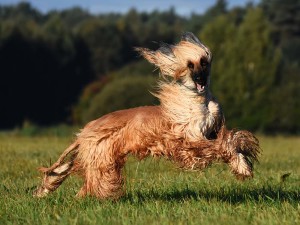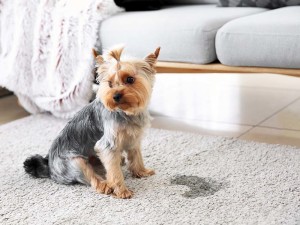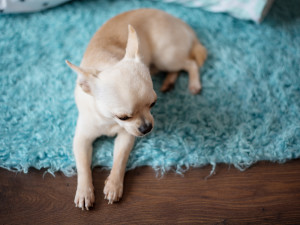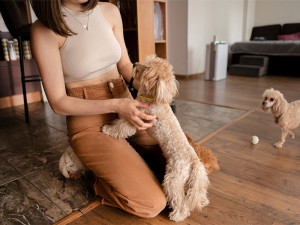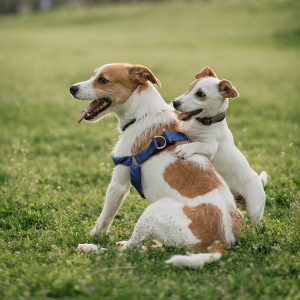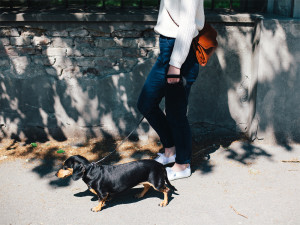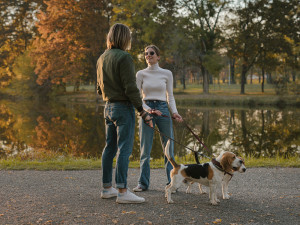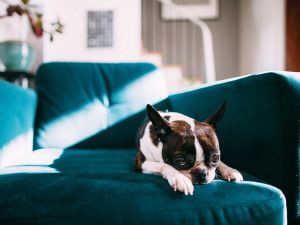Why Does My Dog Pee When Excited? Experts Explain What to Do About It
You’re happy to see them, too. But you’d be even happier if they didn’t create a mess.

Share Article
In This Article:
Is It Normal for Dogs to Pee When Excited? Why Dogs Pee When Excited How to Stop Your Dog From Peeing When Excited What Not to Do if Your Dog Pees When Excited How to Tell if Inappropriate Urination Is a Medical Problem
Have you ever come home to a tail-wagging, ear-flopping, leaping dog who greets you with a puddle on the floor? You’re not alone.
Many pet parents have had the “Oh no, not again” moment when their pooch loses control of their bladder before they can strap on a leash and head out the door. This quirky behavior can leave you wondering what’s going on inside your dog’s brain — whether it’s excitement from you coming home, meeting new people, or feeling overwhelmed.
What can you do when your dog pees when excited? While it may seem like a mystery (or minor disaster), excited urination is common in dogs, especially younger ones still learning bladder control. Your dog is likely experiencing an emotional overload, so there’s no need to panic.
Here’s the rundown on why it happens, what you can do, and how to stop it from happening every time you get home from work (or when your dog gets a little excited).

Main takeaways
Excited urination is a common behavior, especially in puppies or younger dogs, caused by emotional overload or anxiety during moments of excitement.
Dogs may lose bladder control when overwhelmed by joy, anticipation, or anxiety, and it’s often an automatic response.
Rewarding calm behavior, like sitting or not peeing when excited, can help teach your dog better bladder control during overstimulating moments.
Punishing or getting angry at your dog for peeing during excitement won’t help, and may worsen the problem by increasing anxiety.
If your dog’s urination seems frequent or includes signs of pain, it’s essential to visit a vet to rule out underlying medical problems like urinary tract infections.
Is it normal for dogs to pee when excited?
Yes, it is common for dogs to pee when excited. While it may seem embarrassing or like negative behavior, peeing when excited doesn’t indicate a bad or disobedient dog. It’s a quirk of their biology and emotions.
This behavior is often seen in puppies and younger dogs who haven’t mastered bladder control yet. However, even older dogs can experience excited urination in moments of intense joy or anxiety. Think of it as the canine version of a nervous laugh or accidental snort. It happens when they feel overstimulated, excited, or overwhelmed (sometimes by the sight of you coming home after a long day away).
Before you panic and assume your dog is destined to pee when excited, take a breath. This isn’t typically a sign of something serious. If you notice that your dog pees in certain situations, like when greeting you or playing with other dogs, it’s part of their emotional response. However, you should consult a veterinarian if the peeing seems more frequent and paired with negative body language, like whimpering or a tucked tail.
Why dogs pee when excited
Dogs pee when excited because they have difficulty controlling their bodily functions when their emotions are in overdrive. According to Dr. Alisha Kidwellopens in new tab, a licensed veterinarian at North Carolina’s Cabarrus Animal Hospital, this kind of urination is often tied to over-excitement or anxious feelings in younger or less confident dogs. They’re not purposefully trying to be disrespectful, spiteful, or disobedient. It’s an automatic response.
Emotional overload: Dogs pee when excited due to overwhelming emotions such as anticipation, anxiety, and joy. It’s how their body reacts to high-energy situations.
Submissive behavior: Some dogs pee to prove they aren’t a threat, especially when meeting new people or dogs.
Instinctual response: For many dogs, peeing when excited is automatic. They don’t think about it or realize their body is doing it. It’s a reflex they can’t control.
Social signaling: Usually, when a dog meets another dog, they pee when excited to communicate their feelings.
How to stop your dog from peeing when excited
1. Use positive reinforcement.
Any good pet parent knows that rewards can be powerful tools. When your dog behaves calmly and doesn’t pee during an exciting moment, praise them and give them their favorite treats. Use positive reinforcement to encourage calm behavior. So, when they greet you without drenching the floor, reward them with a treat, a pat on the head, and a “good dog.”
2. Desensitize them to exciting stimuli.
Does your dog lose their cool when you walk through the door? Instead of greeting them excitedly when you come home, ignore them for a minute or two until they calm down. Don’t mirror their excitement. This helps them remain calm but expectant to avoid peeing from overstimulation.
3. Return to base obedience training.
Basic commands can help your dog focus during moments of intense excitement. Train your dog to “sit” or “stay” calmly when you walk in the door, making them less likely to overreact. Obedience training can help dogs manage their energy and focus on you instead of becoming overwhelmed by the excitement of a situation.
4. Create a calm environment.
Dogs are sponges for energy. They may get overwhelmed if you constantly run around and exciting things happen. Establish a peaceful routine to create a calm, predictable environment for your dog. Your pup will mimic your energy and react accordingly to exciting stimuli. Keeping your mood controlled and stable will help reduce urine-soaked outbursts of excitement from your dog.
5. Limit new stimuli.
One of the best ways to reduce excited urination is to limit the number of new things your dog is exposed to at one time. When meeting new people or animals, keep the situation low-stress and controlled. Limit the number of people they meet at once or take it slow with new experiences, especially if your dog is easily overwhelmed.
6. Get plenty of exercise.
Dogs, especially puppies, need to burn energy. If they don’t get enough exercise, their pent-up excitement can result in puddled accidents. Regular walks, playtime, and mental stimulation, like games and puzzle-style toys, are essential to keep your dog calm until it’s time to release energy. A well-exercised dog is less excitable, meaning fewer pee spots on the floor.
7. Focus on potty training.
Revisit the basics of potty training. Does your dog have an outdoor routine? Do they have plenty of opportunities to relieve themselves throughout the day? A quick potty break before exciting moments will limit accidents, while regular trips outside ensure their bladder remains controlled and (mostly) empty. Is a new guest coming over? Take your pup out for a walk before the guest arrives so they won’t pee on the floor even if they get over-excited.
What not to do if your dog pees when excited
Punish them.
Punishing your dog for excited urination is cruel. It would be like someone yelling at you when you sneezed or coughed. For many dogs, peeing when excited is a natural bodily response that they can’t control. Punishing them would only confuse and scare them. It would add to their anxiety, making the situation worse.
Ignore them.
Your dog may not realize they’ve had an accident, but they will likely discover the mess after the excitement has passed. Many dogs will feel shame and embarrassment after an accident. Don’t ignore that it happened. Calmly clean up the mess and use basic commands to redirect their attention to gentle, positive behavior, like sitting or lying down.
Get angry.
Getting mad at your dog won’t help them stop peeing when they get excited. Dogs don’t have the bladder control we wish they did, so getting angry is stressful for them and you. Stay calm, and remember they aren’t doing this intentionally — it’s an emotional overflow.
How to tell if inappropriate urination is a medical problem
If your dog’s accidents are frequent, severe, or accompanied by signs of pain, blood, or change in color or quantity of urine, schedule a veterinarian appointment immediately. Medical issues like urinary tract infections, bladder stones, or kidney problems could lead to inappropriate urination. Trust your gut — if something doesn’t feel right, get your dog checked by a professional.
Bottom line
Excited urination is a common (albeit inconvenient) behavior in dogs.
It is a natural response to emotions, especially in puppies.
You can help your dog learn to control their bladder during exciting moments by practicing positive training techniques, understanding, and patience.
Remember to keep calm, reward good behavior, and give your dog time to mature.
Many puppies will eventually develop solid bladder control.
FAQs
Why does my dog pee when I pet them?
Your dog may pee when you pet them because they feel excited, anxious, or submissive. This is common in puppies or dogs still learning to control their bladders and emotions.
Why does my dog pee when I come home?
Your dog loves seeing you. You’re their favorite person. They can’t contain their joy when you come home. Peeing is the overflow of excitement to show how much they missed you.
Do dogs grow out of excited peeing?
Yes, many dogs grow out of peeing when excited. Puppies have poor bladder control, but learn as they mature and their muscles strengthen. However, it can be a more challenging (even lifelong) issue for anxious or excessively submissive dogs.
How long does submissive urination last?
Submissive urination typically decreases as your dog matures and gains confidence. With positive reinforcement and basic obedience training, you can help your dog manage their emotions and control negative behaviors as they grow.
References
“Why Do Dogs Pee When Excited – [Vet Explains Pets].” Vetexplainspets.com, 2024, vetexplainspets.com/why-do-dogs-pee-when-excitedopens in new tab. Accessed 31 Dec. 2024.

Valerie Mellema
Valerie Mellema has a Bachelor of Science in Agribusiness and Equine Industry from West Texas A&M University. She has been a professional writer for the past 20 years, covering a wide variety of pet health and care topics before founding a nonprofit focused on mental health in children and thoroughbred aftercare. She has four Border Collies and eight retired racehorses.
Related articles
![Tan Chihuahua dog laying on aqua rug looking down shamefully]()
“Why Is My Adult Dog Peeing In The House?”
How to re-housetrain a dog of any age.
![A woman sitting on a floor playing with her dogs.]()
How to Know if Your Dog Has Imprinted on You
If they’re following you around like your shadow, there’s a reason for that.
Does Your Dog Think Every Day Is Hump Day? Dog Humping and How to Stop It.
In moderation, it’s normal. Excessively? It’s not.
![Woman walking her small black dog outside on leash.]()
Do Small Dogs Pee More Often?
Research shows that little dogs may feel the need to scent mark more frequently than big dogs.
![A couple walking their two Beagle dogs on leashes on a fall day]()
Why Do Dogs Pee on Other Dogs (and Leashes) During Walks?
Is your dog guilty of this offense?
![A Boston terrier hanging out in a teal blue chair]()
SOS: Why Does My Dog Pee When I Pet Them?
Keep the faith; you can fix this pee-action.

